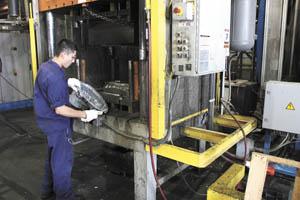Ford’s Impact
Published 12:00 am Thursday, August 24, 2006

- Joshua McCoy/Daily NewsJose Migel of Bowling Green trims transfer case housings for the Ford F-150 on Wednesday afternoon at Trace Die Cast in Bowling Green.
Almost a week after Ford Motor Co. announced production cuts for its pickups and sport utility vehicles, local suppliers to the automaker say they, too, will see production cuts.
But company leaders for two Bowling Green-based suppliers to Ford say their client diversification eliminates any concern for layoffs.
Last week, Ford said it would reduce fourth-quarter production in North American by 21 percent, cutting output by 168,000 vehicles.
Ford is not releasing details on how the cuts will affect local suppliers.
“We know that this action is significant and that many suppliers will reduce production in the fourth quarter, but we are not providing those types of details,” Ford spokesperson Paul Wood said.
Trace Die Cast on Graham Avenue builds valve bodies for the Ford Explorer, and transmission transfer cases for the F-150 and F-250. Earlier this year, the company received a Q1 quality rating after beginning its supply relationship with Ford in 2005.
Trace Die Cast is staying afloat with rear axle programs from General Motors and Daewoo that offset production cuts from Ford, according to Chris Guthrie, president of Trace Die Cast.
“(Ford) going down will affect us. It won’t kill us, but we will see production cuts from that,” he said. “We will not have to do any layoffs, but it is affecting our overall revenue.”
Guthrie said Trace expected the cuts, but was surprised it was as high as 21 percent.
“We haven’t seen (the cuts) officially yet,” he said.
But Guthrie said he is nervous about Ford’s master production schedules, set to be released next week, which will specify in numbers what the cuts will be.
“We know it’s coming but we just don’t know to what level,” he said.
Trace supplies for GM’s Saturn Outlook, Chevrolet Equinox, Pontiac Torrent and the Buick Conclave vehicle lines, as well as products for Korea-based Daewoo.
Trace will supply for Ford’s fuel-efficient crossover vehicle line in 2008, Guthrie said.
In the meantime, Trace Die Cast will delay some of its anticipated hiring forecast.
“When cycles come and go, we try to be diversified with our products and at some point it will pick back up again,” Guthrie said.
Even with the Ford cuts, 2007 will be an all-time revenue year for Trace Die Cast because of its diversification.
“This year we will do about a 20 percent growth from 2005 to 2006 and we’ll see another 20 percent growth in 2007,” Guthrie said.
NASCO supplies coil suspension springs to Ford but will also reap the benefits of having other clients in the auto industry.
“It will not affect our employment at all, because our sales for 2006 still exceed 2005,” NASCO sales manager Eric Stinson said. “Of course, our original forecast was higher than what it will be because of the decrease. Our sales will not meet what we originally thought.”
As a result, NASCO will use less overtime.
“If you have one automaker that is suffering greatly and if you have all your business with them, you’re going to suffer with them,” Stinson said. “We diversify our customer base. Ford is a valuable customer.”
NASCO also supplies Toyota, Honda and Subaru.
Bowling Green Metalforming, a subsidiary of Canadian-based Magna International, isn’t saying much about Ford’s announcement.
BGM supplies frames to the Louisville Kentucky Truck Plant, which will see temporary layoffs along with the Louisville Assembly Plant.
“It is too early to comment on what the impact – if any – will be to the Bowling Green facility,” said Tracy Fuerst, Magna spokesperson. “Keep in mind, Ford announced cutbacks on F-150 trucks, not the F-250/350 series, which is what Bowling Green supplies.”
In July, BGM was on track to add 100 jobs for January’s production for Ford’s F-250, F-350, F-450 and F-550 heavy-duty pickup frames.
William Parsons, the executive director of Bowling Green’s Global Advanced Leadership Center, met with Ford President Bill Ford last week.
Parsons sees Ford having short-term pain for long-term gains.
“What I see happening is that you have the short term, where you have the sales reduced, but in the long term, you’ll have stronger, more healthy companies,” he said. “Ford and the others are retooling and readjusting and the end result will be a stronger, more viable, industry for everyone concerned.”
Parsons said this is the time for local suppliers to take advantage of an opportunity to play a bigger part in helping original equipment manufacturers compete with pressures in the global market and rising energy costs.
“Becoming more nimble and becoming more flexible is something that all OEMs will need to do in order to compete in the global market,” he said. “The opportunity will continue to be there for our local suppliers but it will be even more competitive as far as meeting the needs of the OEM.”
“You’re going to see a near-term reduction, but as the OEMs retool and provide more cost-efficient vehicles to operate, you’ll see a bump upwards,” he said.
The GALC hosts its annual Global Automotive Conference next April in Louisville, with Ford as the host company for the event, Parsons said.
Suppliers Dana Corporation in Glasgow and Bowling Green’s Bando USA and Sumitomo Electrical Supplier Systems will not be affected because those facilities do not supply to Ford.
“The recent announcement from Ford will not impact our Glasgow, Kentucky, facility in any way because that particular plant produces axle components and brakes for heavy-duty trucks,” Dana Corp. spokesperson Chuck Hartlage said. “It’s an all together different market.”
Dana Corp. filed for Chapter 11 bankruptcy protection in March, resulting in layoffs at the Elizabethtown plant in February, a month after the factory renewed a contract to make F-150 frames. That plant also builds frames for Ford’s Expedition and Lincoln Navigator vehicles.
Suppliers to automobile manufacturers should be prepared to deal with uncertainties and turmoil in the industry, according to Jim Hizer, chief executive officer of the Bowling Green Area Chamber of Commerce.
“With recent developments in the automobile industry, suppliers must be flexible and fleet-footed in order to respond to changing consumer tastes and fluctuating gasoline prices,” Hizer said.
More cuts could be on the horizon when Ford spells out the acceleration of its restructuring plan next month.
Ford announced it would close 14 North American plants and eliminate 30,000 union jobs by 2012 in January.
– The Associated Press contributed information for this article.






